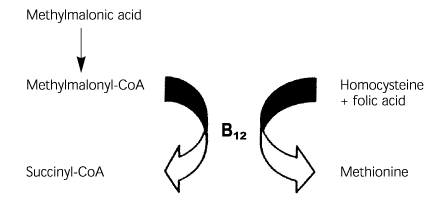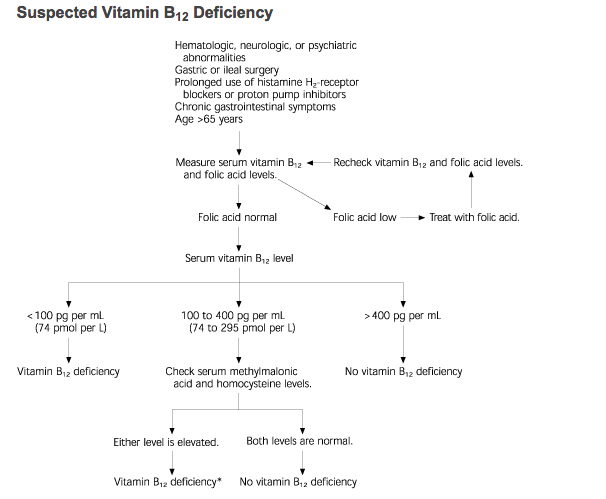Don’t ever stop taking your Vitamin B12
All you need to know about a seriously important vitamin.
Even if you aren’t vegetarian it doesn’t mean vitamin B12 is something you can ignore.
DEFICIENCY RATES
Deficiency has been found;
62% among pregnant women,
Between 30 and 86% among children,
41% among adolescents,
And up to 90% among the elderly.
MEDICATIONS THAT DEPLETE VITAMIN B12
On top of the dietary deficiencies, medications also deplete B12 including:
Antacids like ranitidine,
Proton pump inhibitors like tecta, prilosec, prevacid, and nexium,
Diabetes medications like metformin,
And the birth control pill depletes B12 from the body.
HEALTH CONCERNS THAT DEPLETE VITAMIN B12
Conditions that negatively affect B12 absorption are:
- Colitis,
- Crohn’s,
- Heartburn/Reflux,
- Atrophic gastritis,
- Peptic ulcer,
- Alcoholism,
- Tea and toast diets (malnutrition),
- and pernicious anemia don’t let you absorb B12.
- If you suffer from Irritable bowel syndrome (IBS) you likely don’t absorb B12.
- That’s a lot of people.
WHAT B12 LOSS CAN DO TO YOU?
Symptoms of vitamin B12 deficiency, which usually come on gradually, include;
- Fatigue and weakness,
- Brain Fog,
- Swollen glossy tongue,
- Cracks in skin,
- Muscle pain,
- Increased blood pressure,
- Nausea,
- And constipation.
Long-term and severe vitamin B12 deficiency can lead to nerve changes such as;
- Numbness,
- Tingling in the hands and feet,
- Balance and memory problems,
- Depression, and
- Infertility.
WHAT’S THE BEST WAY TO TEST B12?
Testing for deficiency isn’t straightforward. When studied by blood testing B12 levels deficiency was found in 7% of vegetarians and 52% of vegans. We know using better more sensitive but not readily available testing methods found 68% deficiency in vegetarians and 83% for vegans. Only 5% of healthy meat eaters are low. What a difference and an important one at that. Deficiency also precedes symptoms by a while. For heart disease and permanent nerve damage caused by B12 deficiency some people don’t have a while.
The best test for Vitamin B12 deficiency is called holo-transcobalamin (holo-tc) because it is the most sensitive to identify people who are actually deficient. You’ve probably never heard of holo-tc because it’s very hard to come by and isn’t convenient. Other tests like serum B12 aren’t as good, but are commonly available to order unlike holo-tc.
Serum tests for B12 have different ranges depending on the lab and country you are tested in. “Acceptable” range in North America is anything above ~150, but many other countries find this too low and encourage 450 to the the lower limit of normal. In fact, many people still have symptoms at less than 450 and improve once starting to supplement B12.
Urine and blood tests looking for a marker of B12 metabolism called Methylmalonic Acid (MMA) are good at identifying long term deficiencies. When studied, MMA increases precede serum B12 deficiencies. Urine MMA is a good test for people who have digestive conditions and blood MMA is good for people who have kidney disease.
Homocysteine in the blood is another good marker for deficiency, which also precedes blood B12 deficiency. Homocysteine is easy to order just like total serum B12 and it shows you what kind of damage there may be from B12 deficiency, but it isn’t specific to B12. If you or your doctor are really trying to determine your B12 status – a panel of MMA, serum B12 and homocysteine provides the most comprehensive and detailed picture.
In a study of almost 500 elderly people who were B12 deficient 98.4 percent had elevated serum methylmalonic acid levels, and 95.9 percent had elevated serum homocysteine levels. Only one patient out of 406 had normal levels of both metabolites, resulting in a sensitivity of 99.8 percent when methylmalonic acid and homocysteine levels are used for diagnosis. Sensitivity means the test is positive and you actually have the disease, which means it’s a good test. Even though these markers were elevated showing a problem with B12 other markers that we typically rely on like hematocrit and mean corpuscular volume aren’t necessarily out of range. In the same study, 28 percent of the patients had normal hematocrit levels, and 17 percent had normal mean corpuscular volumes. Just using serum B12 alone can result in up to 50% missed diagnosis of B12 deficiency!
HOW TO GET B12 BACK INTO YOU?
Diet
B12 is only found in animal products. End of story. There is a version of B12 in plant based foods, but it’s not the kind human bodies utilize for health. If you are deficient while eating animal based foods then something is wrong with your absorption. If you are deficient while eating plant based foods then you need to add B12 through fortified foods or supplementation.
Injections
Although not the easiest for the squeamish, injections provide a route of administration that avoids issues with poor digestion and often is clinically rated as the most effective at increasing energy and mood. A quick shot into the thigh, arm, or butt muscles can be a painless way of providing immediate benefits. At first weekly shots are necessary to ‘front-load’ then can be stretched out to monthly injections.
Oral
Not a bad way for people to get B12 but for some people with digestive concerns it may not be ideal, but still doable. Even if someone has trouble with their digestion the vitamin still gets passively absorbed in the intestines. Some people will find using injections at first then switching to oral B12 works well to keep their blood level happy and symptoms low.
Sublingual (under the tongue)
Provides equal absorption and stable blood levels as injections and is a great way to avoid a shot as well as any risk associated with taking the B12 orally and not having it be absorbed well.
WHAT KIND OF B12 DO YOU NEED?
B12 comes in three available forms:
Cyanocobalamin – Most common, but not the best.
Hydroxycobalamin – Superior to cyanocobalamin.
Methylcobalamin – Considered the most effective, especially for neurological symptoms of B12 deficiency and has been shown to be useful in supporting many other health conditions.
The daily requirement of B12 in the diet is 2mcg (it’s stored in the body for months). There is roughly a one percent rate of passive absorption of B12 in our intestines so a daily dosage is usually 1000mcg to cover your bases.
B12 COULD NOT BE MORE IMPORTANT FOR VEGETARIANS AND VEGANS
Meat-eaters can stop reading here.
Even vegans have heart attacks. The science of nutrition has focused its attention on the role animal fats and high glycemic index diets have on heart disease in the general population. We have come to associate heart attacks and strokes as meat-eating problems. Going veggie is often the lifestyle treatment of choice for sufferers of cardiovascular disease. But vegetarians don’t get off scot-free.
The concern with vegetarians and heart disease, as well as a host of other diseases, seems to be in the disrupted metabolism of an essential amino acid called methionine resulting in what is referred to as hyperhomocysteinemia or too much homocysteine in the blood. (Graph below ℅ AAFP demonstrating Vitamin B12 metabolism).

Homocysteine is an amino acid whose metabolism from methionine requires vitamin B9 and vitamin B12 and vitamin B6. These vitamins are very important for proper and ideal health and often require vigilance in the vegetarian community. We commonly associate B vitamins with the nervous system, but their relationship with almost all of our organ systems is much more intimate. As it seems, much of this relationship has to do with homocysteine.
Our understanding of homocysteine has not yet been able to reveal whether its increase is a cause for certain common diseases or if it is merely a byproduct of the disease process itself. However, disturbed methionine/homocysteine metabolism is implicated in:
Congenital heart disease,
Cleft lip and palate,
Late pregnancy complications,
Neurodegenerative and psychiatric diseases,
Dementia,
Osteoporosis,
And heart attack and stroke. Homocysteine and/or its derivatives are considered especially toxic to the cardiovascular system.
We have identified different degrees of hyperhomocysteinemia. The severe kind is generally associated with genetic deficiencies or mutations that govern enzyme functioning related to homocysteine. A milder version is seen in folate and B12 deficiencies, usually noted in fasting conditions or vegetarianism/veganism. Experimental evidence suggests that higher blood levels may result in actual physical changes to our blood vessels. The more homocysteine in our blood the more sustained injury to artery walls, greater increase in inflammation around arteries, constriction of arteries, plaque buildup and blood clot formation. All of these mechanisms are the same by which heart disease happens in meat-eating populations, yet the cause may be completely different. What is believed to happen is homocysteine produces free radicals that oxidize other cells and tissues in our bodies. Put in another way, it produces particles that rust away our insides and have a special affinity for our blood vessels and blood clotting. Imagine a damaged blood vessel supplying a vital part of our body with vital nutrients like a rusty clogged pipe not letting blood get to its destination. The organ starves. Often the destination is our heart or brain resulting in a heart attack or stroke, respectively. Recent epidemiological studies conclude that vegetarians present significantly higher homocysteine levels and lower vitamin B12 levels than non-vegetarians. Also, in some studies, vegetarians have been found to suffer in greater numbers from diseases like dementia and pregnancy related concerns. Also, overall mortality rates between vegetarians and non-vegetarians are roughly similar. Paying closer attention to B vitamin consumption may prove to benefit longevity of life and quality of life for vegetarians even further. If the solution is in part or entirely lies with our consumption of B vitamins, then we can safely say we will be only improving our wellbeing and preventing future occurrence of disease.
Vegetarians and vegans who eat food fortified with vitamins B12, B6 and folate probably don’t have much to worry about in the way of homocysteine or heart disease. Still, we eat in a world of convenient foods devoid of any nutritive value and eating fortified foods or supplementing is a constant reminder for many people. This is another reminder. As a vegetarian or vegan it is imperative that we be cognizant of our daily dietary needs to be our best selves. I believe that sometimes when we know better, we do better. Ensuring simple daily measures such as including B vitamins enables us to live to be our best and prevent the worst.
Below is an algorithm for clinicians and patients to use for understanding how to navigate the B12 testing maze ℅ AAFP.








Hi Dr. Parmar,
Can the holoTC test be ordered in Canada? I’m also in BC and it seems that Lifelabs doesn’t do this test. I’ve also asked my doc about the MMA test before and she looked at me like I suddenly grew 5 heads! So, she would not order the MMA, nor the homocysteine test either.
Thanks!
I don’t believe any lab does the holoTC except for hospital labs like St Paul’s which means a specialist would likely have to order that. Lifelabs does do the MMA and Homocysteine, but find a doctor who won’t stand in the way of you getting it tested. OR see an ND who can test them for you, but you will have to pay the private lab fee for doing them this way.
Thank you, Dr. Parmar. Yes, I have found that to be the case…MD’s won’t order the MMA and homocysteine, but it can be expensive to get the tests done through the ND route (especially when I’ve been doing this a lot lately…it adds up!). Wonder why the holoTC test is so “rare” especially when it can give us information on the B12 that is actually active??? Guess it’s just another example where allopathic medicine doesn’t make sense.